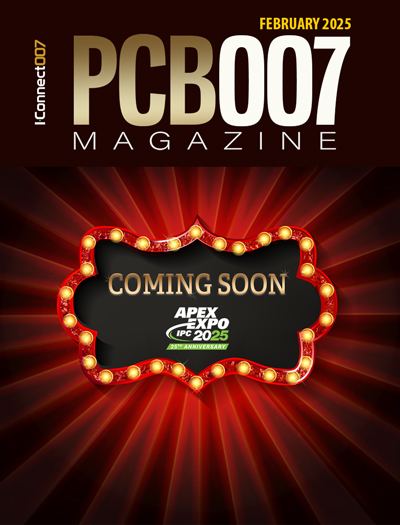-

- News
- Books
Featured Books
- pcb007 Magazine
Latest Issues
Current Issue
It's Show Time!
In this month’s issue of PCB007 Magazine we reimagine the possibilities featuring stories all about IPC APEX EXPO 2025—covering what to look forward to, and what you don’t want to miss.

Fueling the Workforce Pipeline
We take a hard look at fueling the workforce pipeline, specifically at the early introduction of manufacturing concepts and business to young people in this issue of PCB007 Magazine.

Inner Layer Precision & Yields
In this issue, we examine the critical nature of building precisions into your inner layers and assessing their pass/fail status as early as possible. Whether it’s using automation to cut down on handling issues, identifying defects earlier, or replacing an old line...
- Articles
- Columns
Search Console
- Links
- Media kit
||| MENU - pcb007 Magazine
indie Semiconductor Unveils Advanced Qi2 Wireless Charging SoC for Automotive Applications
August 26, 2024 | indie SemiconductorEstimated reading time: 1 minute
indie Semiconductor, an automotive solutions innovator, has announced iND87204, its next-generation, highly-integrated automotive wireless charging system-on-chip (SoC). Fully compliant with the Wireless Power Consortium’s (WPC) Qi 2.0 technical standard, iND87204 also extends support to the new Magnetic Power Profile (MPP) feature - branded “Qi2” by the WPC - bringing an improved charging experience by magnetically aligning devices with inductive charger coils for more energy efficient, reliable and convenient charging. The SoC integrates multiple Arm ® Cortex ® processors for application and WPC stack processing, and all of the key in-vehicle serial interfaces, power management, DC-DC conversion, signal conditioning, WPC inverter drivers, power FETs and peripheral drivers to enable a fully Qi2-compliant wireless charging solution delivering up to 15 watts of power.
With the growing ubiquity of wireless charging capability within portable devices such as smartphones, tablets and laptops, drivers and passengers now expect the convenience of wireless device charging in their vehicles on the move. WPC’s latest standard featuring the MPP capability will accelerate the demand for automotive wireless charging due to its much-improved charging reliability enabled by maintaining portable devices in the optimal position irrespective of a vehicle’s motion. Enabled by semiconductor technology, the global in-car automotive wireless charger market is estimated 1 at U.S. $1.9 billion in 2024, and is forecasted to grow to $13.6 billion by 2034-end, representing a 21.9% CAGR over this period.
“Drivers and passengers are demanding seamless, rapid and more reliable portable device charging experiences in-vehicle. Building upon the success of our first-generation wireless charging solution iND87200, the iND87204 delivers on this vision, featuring the industry’s highest component integration for a Qi2 MPP-compliant SoC design, while simultaneously reducing the implementation footprint and external bill-of-materials by up to 50% relative to existing solutions,” said Fred Jarrar, vice president and general manager of indie Semiconductor's Power and ASIC Business Unit. “Our iND87204 solution is supported by high levels of SoC integration and turn-key firmware designs, speeding time to market for our customers while also derisking their developments. The iND87204’s system innovation will help to accelerate OEM deployment of mass-market Qi2-based automotive charging, and create a more engaging in-cabin experience for consumers.”
iND87204 is sampling with lead customers now and will be production released in the fourth quarter of 2024, fully qualified to AEC-Q100 Grade 2.
Suggested Items
OMRON Partners with Wiferion for Inductive AMR Charging
02/28/2025 | OmronWorking together to increase the performance of autonomous mobile robots (AMRs) and enable new application concepts — to achieve this goal, OMRON has certified Wiferion’s wireless charging technology for the LD series robots.
Incheon National University Study Pioneers Breakthrough in Wireless Charging Technology
02/21/2025 | PRNewswireThe efficiency of wireless charging systems is limited by power loss occurring due to frequency changes in the resonant circuits that enable power transfer.
The Knowledge Base: My 2025 Industry Wish List
01/14/2025 | Mike Konrad -- Column: The Knowledge BaseMy 2025 wish list for the electronics manufacturing industry is short. In fact, there’s only one item on the list: reliable EV charging stations. I love to drive cars, off-road vehicles, and boats. I also fly airplanes, and I’m an unabashed tech geek. From computers to tech gadgets, count me in. Because electric vehicles combine my fascination for both propulsion and technology, most of my friends and colleagues are surprised to learn that I do not yet have an electric vehicle. So, what’s holding me back? The answer does not lie with the electric vehicle itself, but with the current state of public EV charging stations.
Nolan’s Notes: Emerging Trends in 2025
01/06/2025 | Nolan Johnson -- Column: Nolan's NotesJanuary is a traditional time to mark changes in our lives. A new year can signal new beginnings. But change is constant. So, as we flip over the calendar into 2025, we look at what’s ahead for the EMS supplier industry. What are your concerns and challenges? What trends are emerging? What can you expect from a new administration?
Fresh PCB Concepts: PCB Design Essentials for Electric Vehicle Charging
11/27/2024 | Team NCAB -- Column: Fresh PCB ConceptsElectric vehicles (EVs), powered by electricity rather than fossil fuels, are transforming transportation and reducing environmental impacts. But what good is an EV if it can't be easily charged? In this month's column, Ramon Roche dives into the role of printed circuit boards (PCBs) in electric vehicle charging (EVC)—and the design considerations.


